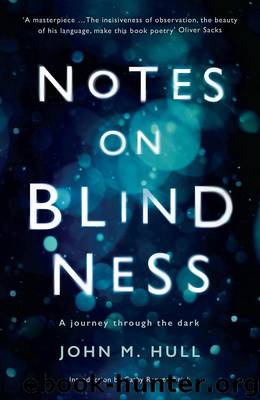1781258597 (N) by John Hull

Author:John Hull
Language: eng
Format: azw3
Publisher: Profile Books
Published: 0101-01-01T00:00:00+00:00
7
Beyond feelings
Winter 1984
13 October
Last night Marilyn and I were talking about whether or not it would have made a difference to my feelings about Thomas and Elizabeth if I had ever seen them. Is the fact that I have never seen them going to be a permanent loss in my relationship with them? Does it matter that they belong entirely to my second life, my blind life?
It is true that Imogen bridges both lives. She was seven when I lost my sight; now she is eleven. Is it not possible, however, that Imogen will remain in my imagination permanently fixed at the age of seven, while Marilyn will always remain young and beautiful?
This is relevant to the experience of blindness as a journey into a dark tunnel. The receding faces of Imogen and Marilyn form a sort of fixed light at the far end, behind me. This provides a point of reference from which I can judge my continued travelling on through the tunnel. In a way, this serves to exaggerate the time I have spent in the tunnel, by providing a point of orientation which makes me aware of the continual recessions of the light. It is as if, during the first part of a journey through space, the voyagers are aware of the speed with which they are parting from the still visible earth, but once out in the black vastness of space, there is no longer the same sense of speed, or time. As long as there is a receding image, one is still aware of departing.
On the other hand, the element of fixation in this, that you go on thinking of the person as he or she was years ago, makes time less real. You have a sense of not having travelled on in your relationships. There is conflict between the timeless, fixated image of not travelling on, and (on the other hand) the sharpened sense of distance, that one is travelling on, further and further, all the time. This conflict helps me to understand the strange poignancy and confusion which I feel in the presence of loved people whom once I saw but now no longer see. This would also explain my distress in meeting my Australian relatives, especially my parents, in the summer.
This is a good example of what the psychologists call ‘cognitive dissonance’. There is discomfort because you are aware of holding two opinions or beliefs which are contradictory. First, I believe that I know what you look like. I have your image in my mind’s eye as I speak with you now. Thus, although I am blind, nothing has changed. I have not changed. You have not changed. I can still relate to you through the mediation provided by that visual image, which is in my memory. Secondly, I know that between that visual memory which mediates between us and my actual present life there is a deep, black river of time, flooding the banks of my consciousness, growing ever wider and stronger, carrying us apart.
Download
This site does not store any files on its server. We only index and link to content provided by other sites. Please contact the content providers to delete copyright contents if any and email us, we'll remove relevant links or contents immediately.
Rich Dad Poor Dad by Robert T. Kiyosaki(6633)
Pioneering Portfolio Management by David F. Swensen(6301)
How To Win Friends and Influence People by Dale Carnegie(4513)
The Money Culture by Michael Lewis(4207)
The Dhandho Investor by Mohnish Pabrai(3765)
The Wisdom of Finance by Mihir Desai(3748)
Liar's Poker by Michael Lewis(3450)
Fooled by Randomness: The Hidden Role of Chance in Life and in the Markets by Nassim Nicholas Taleb(3124)
The ONE Thing by Gary Keller(3071)
Mastering Bitcoin: Programming the Open Blockchain by Andreas M. Antonopoulos(3045)
The Intelligent Investor by Benjamin Graham Jason Zweig(3042)
The Psychology of Money by Morgan Housel(3037)
Rich Dad Poor Dad: What The Rich Teach Their Kids About Money - That The Poor And Middle Class Do Not! by Robert T. Kiyosaki(2958)
Investing For Dummies by Eric Tyson(2955)
How to Day Trade for a Living: Tools, Tactics, Money Management, Discipline and Trading Psychology by Andrew Aziz(2949)
How to Win Friends and Influence People by Dale Carnegie(2915)
Market Wizards by Jack D. Schwager(2701)
How to Pay Zero Taxes, 2018 by Jeff A. Schnepper(2655)
Zero Hour by Harry S. Dent Jr. & Andrew Pancholi(2649)
